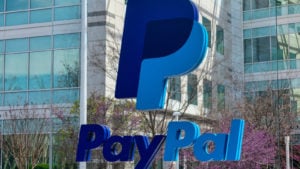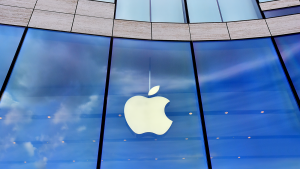With uncertainties plaguing the markets, savvy investors can find solace in resilient blue-chip stocks. These stalwarts, known for their consistent performance and resiliency, have become a haven for those looking to safeguard their investments. Moreover, their lower beta values contribute to a sense of security, aiding in capital preservation even when the market tides turn turbulent. Further sweetening the deal, these blue-chip stocks frequently boast attractive dividend yields, offering a consistent stream of returns that can act as a financial cushion. These robust businesses have shown an ability to grow steadily over the years.
Lastly, for those seeking a long-term strategy, these companies represent the intersection of stability and growth, offering the potential for compounding returns over time. These top performing blue-chip stocks are the cornerstone of a well-balanced portfolio, providing essential stability in uncertain times.
PayPal (PYPL)

PayPal (NASDAQ:PYPL) is a juggernaut in the fintech sphere, producing a robust first-quarter earnings report which comfortably surpassed consensus estimates. The firm’s projected earnings-per-share for fiscal 2023 is $4.95, pointing to a 20% year-over-year growth rate, slightly higher than its previous estimate of roughly 18%.
Despite some minor shortcomings in its recent earnings report, PayPal demonstrated a 10% year-over-year growth in total payment volume, which amounted to a whopping $355 billion. Payment transactions rose by 13% to 5.8 billion. With a market share of around 42%, PayPal continues to dominate the realm of online payment processing despite the growing competition. Its secure and user-friendly platform has accumulated a substantial active-account base of 433 million, which continues to grow each quarter. Moreover, PYPL stock is down more than 35% from its 52-week highs, pointing to incredible upside ahead.
Newmont Corporation (NEM)

Newmont Corporation (NYSE:NEM) is the world’s premier gold producer with a diverse portfolio that spans North America, South America, Australia, and Africa, offering up gold, copper, silver, zinc, and lead. Additionally, with its recent acquisition of Newcrest Mining Limited, valued at approximately $19 billion, it has added a treasure trove of Tier-1 jurisdiction assets to its portfolio, further solidifying its dominance in the mining sphere.
Furthermore, Newmont has effectively positioned itself to capitalize on the anticipated gold price rallies, expecting a $400 million increase in free cash flow for every $100 rise in the gold price. This boost is bound to bolster dividends and enhance credit metrics, thereby leading to an uptick in valuations. In addition, Newmont is poised to reduce its all-in-sustaining cost, setting the stage for healthy EBITDA margin expansion. Hence, with these promising prospects, Newmont presents an exciting opportunity for the astute investor.
Albemarle (ALB)

Albemarle (NYSE:ALB) is arguably one of the best secondary plays in the burgeoning electric vehicle space. Its powerful lithium segment, a key component in EV batteries, has driven its cash flow expansion. As EV adoption accelerates, a lithium supply gap looms on the horizon, and the firm is strategically positioned to capitalize on this trend.
A glimpse into Albemarle’s progress reveals an impressive growth trajectory. In 2019, it reported a lithium conversion capacity of 85ktpa, but by 2022, this capacity had more than doubled to 200ktpa. Moreover, by 2027, it aims for a whopping 550ktpa capacity. As a result, robust revenue and EBITDA growth are expected for the foreseeable future. Despite a relative dip in lithium prices in 2023, Albemarle continues to deliver stellar growth across both lines. Additionally, it boasts a dividend profile marked by 28 years of consecutive payout growth.
Apple (AAPL)

Apple (NASDAQ:AAPL) continues to innovate, staying true to its reputation as one of the largest tech titans. With its timeless products, such as the iPhone, contributing over half of company revenues, it has built a massive cash war chest, making it a relatively safe bet.
Recently, Apple unveiled its $3,500 AR/VR headset, perhaps its most significant leap in product innovation in the past decade. In tandem with this, there’s plenty of buzz around the potential launch of an electric car by 2026. Diversification is key for the firm, particularly with its services and wearables divisions, predicted to swell in the coming years, and its foray into massive new growth markets such as India. Furthermore, it reported a whopping $62.6 billion in operating cash flows in the first half of fiscal 2023 and an impressive $167 billion in cash and equivalents. Hence, Apple is well-positioned to fuel big-ticket investments and drive the wheel of innovation.
Chevron (CVX)

Oil behemoth Chevron (NYSE:CVX) experienced a gusher of cash flows last year due to rising oil prices. It delivered a whopping $31.7 billion in free cash flows last year, almost a 72% bump on a year-over-year basis. Though oil prices have dropped from their peak last year, they have held up remarkably well, offering incredible upside ahead for its shareholders.
Moreover, Chevron continues to focus on delivering value to shareholders. This is evident in its share buybacks and a handsome dividend yielding over 3.8%. In its first quarter, it committed to returning a staggering $2.9 billion in dividends and repurchasing $3.75 billion worth of shares to its stockholders. Also, it delivered an incredible $6.7 billion profit, outpacing market expectations and coming significantly ahead of the previous year’s $6.5 billion. Also, amid economic uncertainty, Chevron is an undervalued gem with a price/earnings ratio of just over 8 times earnings, backed by a strategy to trim debt and boost shareholder returns.
Tesla (TSLA)

Tesla (NASDAQ:TSLA) continues to race ahead in the fast-paced realm of electric vehicles, dazzling investors with its stock that nearly doubled this year. The firm’s in-house approach and unwavering efforts to slash costs have fueled its massive success. Self-designing components and materials, Tesla has effectively bypassed the need for alternatives, trimming costs substantially along the way. Its strategy, coupled with an audacious goal of rolling out 20 million EVs annually, positions it for improved efficiency and escalating demand.
The past half-decade has seen Tesla’s profit margin shift gears from a negative 20% to an impressive positive 13.7%. The earnings per share have followed suit, skyrocketing by a staggering 2,500%. Though this year’s earnings could potentially dip by double-digit margins, analysts forecast a robust rebound of 40% in 2024. Beyond EVs, Tesla is one of the leaders in the production of lithium-ion battery manufacturing, a critical player in the renewable energy transition. This technological prowess amplifies Tesla’s presence in the EV market, paving the way for ventures into other energy-related sectors and fueling further growth opportunities.
Johnson & Johnson (JNJ)

Johnson & Johnson (NYSE:JNJ) is a long-standing titan in the healthcare sphere that has effectively carved out a lucrative niche in the high-margin pharmaceutical space. Its strategic emphasis has seen its pharmaceutical division account for a robust 54% of total revenue. Moreover, it experienced a 7% leap in adjusted sales to an amazing $13.4 billion in the first quarter. Standout drugs such as Stelara and Darzalex raked in over $2.2 billion each, underpinning its monstrous growth.
Likewise, a recent pivotal move saw the firm spinning off its consumer wellness arm, Kenvue, a decision that’s streamlined its corporate structure. This maneuver should fuel an enhanced valuation for both J&J and Kenvue as independent entities. Layer that up with its sturdy 3% dividend yield and more than $13.5 billion in trailing free cash flow and you have a compelling case for J&J’s continued dominance in the healthcare sphere.
On the date of publication, Muslim Farooque did not have (either directly or indirectly) any positions in the securities mentioned in this article. The opinions expressed in this article are those of the writer, subject to the InvestorPlace.com Publishing Guidelines
